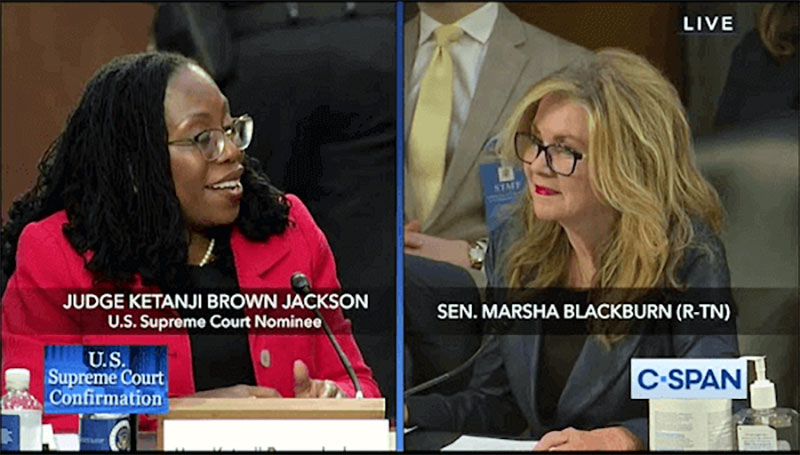
Senate Judiciary hearings on Biden’s Supreme Court nominee Ketanji Brown Jackson began this week. Monday’s hearing was simply opening statements from Judge Jackson and the members of the committee. Although all remarks from Senators were civil and complimentary of her credentials, they also gave us an indication of their attitude toward the nominee and the concerns they may iterate over the next two days.
Senate Republicans are rightfully still sore over Democrats’ political fanfare during the last two Supreme Court nominee hearings. Sen. Lindsey Graham (R-SC) assured Judge Jackson that she would be given a fair hearing as opposed to the hearing that Justice Brett Kavanaugh received. Sen. Mike Lee (R-UT) expounded on Sen. Graham’s comments by saying:
Engaging in the politics of personal destruction is not something we should ever aspire to. It is something that has occurred in this committee in the context of Supreme Court nominations.
The most embarrassing moment from the hearings came from the answers to Sen. Marsha Blackburn’s (R-TN) questions pertaining to gender and women’s rights. She invoked comments made by the late Supreme Court Justice Ruth Bader Ginsberg on men and women having enduring qualities and asked Judge Jackson if she agreed. Judge Jackson dodged the question altogether. She was then asked to define the word “woman.” She asserted that she is not a biologist and does not know the definition. At worst, she could have used a legal definition from a previous Supreme Court ruling. Instead, her answer (or lack of an answer) leads us to believe that she will rule in favor of broadening that definition allowing biological men to insert themselves into women’s private spaces, domestic abuse shelters, and sports.
In the same vein of unsavory answers, several members asked Judge Jackson how she views Roe v. Wade. This is very timely due to the upcoming Supreme Court case, Dobbs v. Jackson, that may topple the abortion precedent. As many Supreme Court nominees have asserted before, she said it was settled law. She then followed up that comment with a discussion on stare decisis, a Latin legal term that ensures courts stand by what has been previously decided. This solidified her dedication to Roe.
The topic of race has been an overarching theme throughout the nomination process. Judge Jackson would be the first black woman to join the Supreme Court if she is confirmed. However, Democrats warned Republicans not to talk about race during the process. That’s quite ironic seeing that Biden made it one of two qualifications for his pick. Additionally, Judge Jackson previously bucked the notion that her race would have any bearing on her rulings saying:
I don’t think that race plays a role in the kind of judge that I have been and that I would be.
Of course, Republicans have not badgered Judge Jackson about her race, but they questioned her about her views on critical race theory (CRT). CRT is a legal theory in which the law is seen through the lens of race and has been inserted into school curriculums to shame young white students. Sen. Ted Cruz (R-TX) asked several pointed questions about her experience with this theory.
First, he held up a children’s book called Antiracist Baby which asserts that babies are taught to be racist. This book is read to students at Georgetown Day School where Judge Jackson serves on the board of trustees. She assured Sen. Cruz that she was unaware that this book was being read because the board of trustees does not oversee the curriculum. She also said:
Senator, I do not believe that any child should be made to feel as though they are racist or though they are not valued or though they are less than their victims, that they are oppressors. I don’t believe in any of that.
Then, when she was questioned on her discussion of the 1619 Project at the University of Michigan, she said she was unaware of the criticisms that it has received. She then summed up her thoughts about CRT by saying:
It doesn’t come up in my work as a judge. It’s never something that I studied or relied on and it wouldn’t be something I would rely on if I was on the Supreme Court.
Another hot button topic is her work on child pornography cases. She consistently gave offenders lesser sentences than the recommended amount by prosecutors. Sen. Josh Hawley described it as an “alarming pattern” of leniency. Sen. Cruz displayed a poster showing that pattern among eight cases that averaged 47.2 percent less than recommended. Judge Jackson seemed unable to accurately defend herself on this issue. She said multiple times that these claims do “not include all of the factors that Congress has told judges to consider, including the probation office’s recommendation in these cases.” Sen. Thom Tillis (R-N.C.) summed up their feelings on this matter saying that she exhibits “empathy beyond what we are comfortable with.”
While Judge Jackson is a highly qualified judge, her progressive judicial philosophy and liberal rulings make her a danger to our nation’s laws. In this week’s Engage with Eagle Forum podcast, First Liberty’s Keisha Russell explains Judge Jackson’s history and the nomination process. You can also watch the hearings here.
Biden’s Supreme Court nominee Ketanji Brown Jackson is put to the test this week as Senate Judiciary members question her philosophy and credentials. Her answers should be concerning to anyone.
















